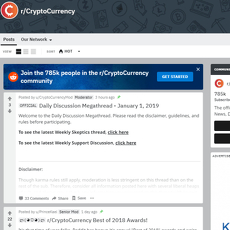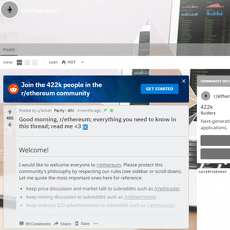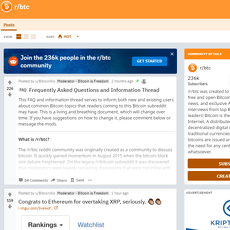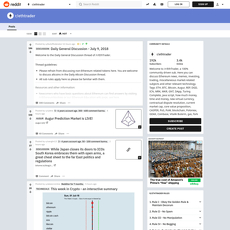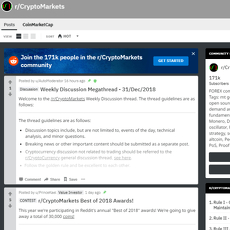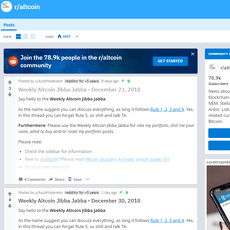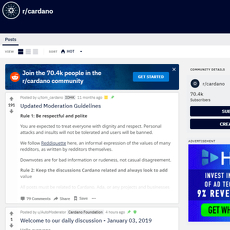r/Ardor Review
r/Ardor
www.reddit.com
r/Ardor (Reddit) Review & Guide: Everything You Need to Know + FAQ
Looking for the fastest way to figure out whether the r/Ardor subreddit is worth your time—without wading through hype, old threads, and random price spam?
If you’re tracking the Ardor blockchain for news, support, building, or just curiosity, here’s the straight take on what you’ll find, how to use it well, and how to dodge the usual traps that waste hours.
The problems most people face with crypto subreddits
Reddit can be a goldmine—or a distraction. With blockchains like Ardor (multi-chain, lots of moving parts), the difference between useful and useless threads gets even bigger. Here are the common headaches I see:
- Hype instead of facts: Threads promising “big news soon” with nothing to back it up.
- Outdated info: You search for “child chain fees” and end up on a 2019 answer that no longer applies.
- Spammy DMs: Post a question, get a stranger offering “support” in private. Not good.
- Confusing rules: Posts removed with no clear reason, or flairs that don’t match what you’re trying to ask.
- Signal-to-noise problems: Useful updates get buried under price chatter or vague speculation.
Quick example: Ask about Ardor node setup or pruning and you might get three answers—one referencing an older release, one from a power user with exact command-line flags, and one pushing you to a sketchy Telegram. Knowing which one to trust is the whole game.
What I promise in this review
- A clear read on r/Ardor’s quality: activity, tone, and how well questions get answered.
- Practical ways to find legit info fast—without scrolling forever.
- Safety tips to avoid fake support and low-effort shills.
- Best practices for asking questions that get real solutions, not generic replies.
I judge communities by usefulness: how quickly you can turn a thread into a working answer, a confirmed update, or a real contact who knows their stuff. Pretty banners don’t help—useful systems do.
Why listen to me?
I spend a lot of time pressure-testing crypto forums, subreddits, chats, and official docs, looking for the shortest path from “I have a question” to “I have a verified answer.” No fluff—just what works in practice and what wastes your time.
Ardor in 20 seconds
Ardor is a multi-chain platform from Jelurida with a parent chain (Ardor) that handles security and staking, and multiple child chains (like Ignis) for apps and tokens. This design lets projects run on their own chains while benefiting from a shared, secure backbone.
If that sounds complex, the Ardor subreddit helps turn it into real examples, release notes, config tips, and “what actually works right now.” You’ll see questions like:
- “What’s the best way to set up an Ardor node with pruning?”
- “Where do the newest Ardor and Ignis updates get announced?”
- “How do I troubleshoot stuck transactions on a child chain?”
That’s the kind of signal you want—fast, specific, and grounded in current releases.
Ready to see who r/Ardor is really for and how it stacks up against X, Telegram, and official blogs? Let’s look at what you can expect next and when to use Reddit vs other channels—so you don’t miss the updates that matter.
What is r/Ardor and who is it for?
Think of r/Ardor as the public square for the Ardor blockchain: a searchable, community-run timeline of releases, fixes, real usage, and honest takes that you won’t get from glossy marketing. It’s where “What does this actually mean for me?” gets answered by people running nodes, building on Ignis, or shipping tools around the ecosystem.
“Trust the code, but read the comments.”
Subreddit basics and link
https://www.reddit.com/r/Ardor/ has been around since Ardor’s early days, so you’ll find years of archived context that helps you see how the platform matured. Activity tends to spike around releases and ecosystem news, then taper into steady troubleshooting and Q&A—normal for a technical blockchain subreddit.
What actually gets traction here:
- Release and upgrade threads — posts summarizing new Ardor or Ignis versions, upgrade steps, and gotchas.
- Node and wallet support — “stuck sync,” config clarifications, pruning/archive questions, UI quirks.
- Ecosystem updates — third‑party tools, explorers, community services, occasional integrations.
- How‑to and walkthroughs — asset exchange tips, child chain usage, account control best practices.
- Context over hype — thoughtful discussions that link to release notes, repos, or docs tend to rise.
Typical example threads you’ll see (titles vary, but the pattern is consistent):
- “[Release] Ardor update is live — changelog + node upgrade notes”
- “Ignis question: sending assets across child chains — what’s the fee logic?”
- “Node won’t sync after upgrade — here are my logs (help)”
- “Community tool: lightweight explorer for child chains — feedback welcome”
One useful side effect of Reddit: posts and answers are indexed and easy to find later. Pew Research has repeatedly noted that while Reddit’s news audience is smaller than other platforms, it’s highly engaged—exactly the kind of crowd that asks for sources and shares reproducible steps. That bias toward verifiable detail plays in your favor when you’re researching a blockchain with real technical depth.
Who gets the most value here
- Developers and builders — sanity‑check design choices, find examples, and spot upgrade implications others already hit. If you’re experimenting with child chain features (e.g., Ignis), you’ll often find prior art or an existing workaround.
- Node operators and power users — compare configs, pruning settings, hardware notes, and version‑specific behaviors. When you’re chasing a sync issue, a 3‑comment thread can save hours.
- Analytical investors — track cadence: release frequency, dev communication, and credible ecosystem progress. Less “to the moon,” more “here’s the PR and what changed.”
- Curious learners — translate Ardor’s multi‑chain design into clear use cases through community explanations, screenshots, and links to docs.
Real‑world scenario: you hit an error after a wallet update. On r/Ardor, someone’s probably posted logs, the exact version, and the fix (or a link to the relevant release note). That trail of evidence is what makes the subreddit valuable when time matters.
How it fits alongside other channels
Reddit is not a replacement for everything; it’s the connective tissue between official info and real usage. Here’s how I position it:
- Official blog/docs (Jelurida) — authoritative release notes and specs. Use these to verify anything that affects funds or production.
- GitHub — code, issues, and PRs. Best for seeing what’s merged and what’s proposed.
- Twitter/X — rapid announcements and ecosystem visibility. Good for first alerts, light on detail.
- Discord/Telegram — fast back‑and‑forth for real‑time help, but ephemeral and noisy.
- Reddit (r/Ardor) — indexed, source‑linked, and community‑filtered context plus reproducible fixes. Great for research and support you can find again.
A simple workflow that works:
- Spot an update on X →
- Open the official post/release note →
- Check r/Ardor for real‑world impact and early issues →
- Confirm on GitHub or docs →
- Bookmark the Reddit thread for future you.
If you’re tired of wading through hype threads, this is where builders, operators, and serious users compare notes. The only question is: how responsive is it when you need help right now? I tested that next—want to see what happened?
Community activity and vibe: is it active and helpful?
Nothing kills momentum like silence. The good news: the r/Ardor feed rarely leaves you hanging. It’s not a firehose, but it’s steady, and the ratio of signal to noise is better than most crypto subs. Threads that ask real questions usually get real answers, and update posts tend to gather comments from people who actually tried the thing, not just cheerleaders.
“Come with questions, leave with links and working steps.”
Post frequency and responsiveness
Expect a consistent trickle of new posts rather than a constant stream. That’s normal for a specialized blockchain with an active but focused user base. In practice, that means your question won’t vanish on page 4 in ten minutes, and people who know the stack will actually see it.
- New posts: A steady cadence, with bursts around releases, node updates, or notable ecosystem news.
- Comment activity: A handful to a couple dozen comments on practical threads (bug fixes, node issues, how-tos). Pure price chatter draws less sustained attention.
- Reply speed: For technical or setup questions, first replies often land within hours; trickier edge cases can take a day. Research on online help communities consistently shows faster first responses correlate with higher satisfaction and return visits—this sub follows that pattern.
Example patterns I keep seeing:
- “Wallet won’t sync after update” — first responses include log prompts, version checks, and a link to a relevant GitHub issue or release note.
- “Child chain fee confusion” — replies reference docs, past threads, and a concrete transaction example to compare.
- “Node setup on VPS” — users share working service files, snapshot tips, and pruning settings that actually save time.
Types of content you’ll find
It’s a practical mix that skews toward what’s shippable and what’s breaking right now—less hype, more hands-on. If you’re building, this is exactly what you want in a subreddit.
- Release notes and hotfix threads: “Ardor vX.X.X – changes, known issues, upgrade notes” with comments confirming fixes or flagging edge cases.
- Ecosystem news: Child chain launches, integrations, and tooling. Look for posts that include links to repos or screenshots, not just headlines.
- Dev updates: Occasional progress notes from builders, plus questions about APIs, pruning, smart features, and performance.
- How-to guides: Node installs, wallet quirks, fee tuning, snapshot/restoration, and config gotchas.
- Governance talk: Debates about roadmaps, sustainability, and trade-offs around features.
- Price chatter: It exists, but it’s not the main show. Threads without substance tend to fade quickly.
- Community showcases: Demos, small tools, dashboards—often with GitHub links so you can verify and test.
Who usually answers questions
Expect responses from people who’ve been around the Ardor stack for a while, plus occasional input from devs or contributors. You’ll know you’re hearing from experienced users when you see:
- References to specific versions: “Fixed in X.X.X” or “Works on testnet with setting Y.”
- Links that matter: GitHub issues/PRs, official docs, or past threads with solved marks or follow-ups.
- Repro steps: They ask for logs, OS, node flags, and transaction IDs—because details decide the fix.
- Mod nudges: When a thread veers off-topic or lacks info, moderators step in with a quick reminder to add details or tag appropriately.
Here’s the subtle but important thing: when answers include context (“this changed after pruning adjustments,” “child chain fees differ in scenario Z”), it’s a strong signal you’re talking to someone who’s shipped or supported production setups.
Culture check
The tone is pragmatic and patient. Newcomers who show they’ve tried something first usually get thoughtful help. Energy is better than average because the sub skews toward builders and power users—not armchair quarterbacks.
- Welcoming: If you post what you tried and the exact error, people tend to meet you halfway. “Help me fix this” beats “Why isn’t this working?”
- Hot-button topics: Expect spirited debate around child chain economics, pruning trade-offs, wallet UX, and exchange listings. Opinions show up, but they’re often backed by test results or code references.
- Hype resistance: Flashy claims without sources get side-eyed. Posts with code, screenshots, or tx hashes get traction.
Research into niche technical communities (and Reddit’s own community best practices) suggests smaller, topic-focused subs often keep a healthier signal-to-noise ratio. That’s what I see here: fewer posts overall, but more that actually help you ship or fix something.
If you like this kind of environment, you’ll fit right in. And if you want to keep your thread from getting ignored—or removed—what are the rules that matter most right now, and how do mods handle spam and low-effort posts? Let’s look at that next so your next post lands and sticks.
Rules, moderation quality, and how not to get your post removed
If you want r/Ardor to work for you, play by the rules and give the mods something worth keeping. The subreddit is focused, generally well-kept, and friendly to people who respect the basics. Here’s exactly how to stay on the right side of moderation and get useful replies fast.
Key rules at a glance
Every crypto subreddit has its own quirks, but the patterns are familiar. If you stick to these, you’ll rarely see your post nuked:
- Stay on-topic: Ardor, its child chains (like Ignis), tooling, releases, and ecosystem projects. Off-topic chain promos or general crypto rants get flagged fast.
- No referrals or airdrop spam: Links with kickbacks, invite codes, or “join my Telegram for rewards” are instant removals.
- Back your claims: If you post “X feature is live” or “Y partnership confirmed,” add a source—ideally the Jelurida blog, the project’s GitHub, or a credible announcement.
- Use flairs/tags where available: Pick the closest match (Support, Release, News, Dev, Discussion). It helps mods triage and helps readers find you.
- No low-effort price posts: “When moon?” isn’t useful. If you discuss markets, keep it grounded with data, on-chain metrics, or specific news that impacts fundamentals.
- Respect privacy and safety: Don’t post seeds, private info, or unredacted wallet details. Don’t tell others to DM you for “support.”
- Be civil: No personal attacks or harassment. Argue ideas, not people.
Sample titles that survive and get engagement:
- [Support] Ardor wallet 2.4.x fails to sync on Windows 11 — logs + steps included
- [Release] New Ardor node build: performance changes + link to changelog
- [Dev] Smart contract example for child chain fees — repo + walkthrough
- [News] Ignis use case in supply chain pilot — source + screenshots
“What you permit, you promote.” Good moderation protects your time by protecting the feed.
How mods handle spam and bad actors
Expect the usual Reddit mix of AutoModerator filters and human review. Spam, off-topic promos, and obvious scams are typically removed quickly—especially if users hit Report. If you’re posting something legitimate that still gets caught, a short modmail with context usually resolves it.
Why this matters: research shows firm, consistent moderation reduces toxic behavior and misinformation spread across subreddits:
- Chandrasekharan et al., ICWSM 2017 — community bans and active moderation curb harassment and improve discussion quality.
- Matias, CHI 2019 — volunteer moderation is a backbone of healthy online communities.
- Horta Ribeiro et al., 2021 — removing bad actors reduces downstream harm across platforms.
Translation: if your post adds value and follows the rules, it stands out. If it looks like hype, it’s gone.
Posting tips that get results
Cut the friction for anyone trying to help you. The more context you give, the faster you’ll get a real answer.
- Use a clear label in the title: [Support], [Dev], [Release], [News], [Discussion].
- For bugs/support:
- Environment: OS, wallet/node version, child chain (e.g., Ignis), API endpoints.
- What you expected vs. what happened.
- Exact steps to reproduce (numbered), error messages, and relevant logs (use a paste service if long).
- Screenshots with sensitive info redacted.
- For releases/announcements: Add a link to the official post or repo, a bullet list of changes, and why it matters.
- For dev threads: Share the repo, code snippets (trimmed), and the specific question you want answered.
- One question per post: It’s easier to answer and easier to find later.
- Edit the OP with the solution: When you fix it, update your original post so others can use it. That edit wins you reputation.
- No link shorteners or obfuscation: Raw, descriptive URLs build trust and avoid removal.
Format examples that work:
- Title: [Support] Ignis asset exchange order stuck — Ardor 2.4.x on Ubuntu 22.04
- Body:
- Node: 2.4.x (fresh install)
- OS: Ubuntu 22.04
- Steps: 1) Submit order via API 2) Check mempool 3) No confirmation after 30 mins
- Expected: Confirmation within N blocks
- Actual: Order pending with no error; log excerpt below
- Logs: link to paste
Etiquette and expectations
The fastest way to get help is to be the kind of poster people want to help. A few ground rules I follow:
- Ask publicly, solve publicly: Keep support in the thread so others learn from it. Ignore “DM me” offers.
- Disagree without drama: Challenge ideas with sources or tests. Skip the sarcasm and character attacks.
- Use Report, not reply, for scams: Reporting cleans the feed faster than arguing with a bot.
- Follow up: Thank the helpers, summarize the fix, and tag it as solved if the flair supports it.
- Respect the mods’ time: If something was removed, re-read the rules, then ask briefly via modmail with specifics.
Want to post smarter and find answers in minutes instead of hours? Up next, I’ll show you the search tricks, flair filters, and sorting methods that surface real updates and working solutions without the scroll. Ready to save yourself a ton of time?
Using r/Ardor for research, updates, and real support
Here’s how I turn r/Ardor into a fast, reliable research feed and a practical help desk—without scrolling for an hour. I’ll show you the simple filters, search tricks, and posting habits that cut through noise and actually get you answers.
“In crypto, speed is nice—certainty is priceless.”
Finding real updates quickly
When I want to know what’s actually happening right now, I don’t read everything. I scan the signal:
- Sort by New to catch fresh releases or issues as they appear. I do this weekly to stay current.
- Sort by Top → This Month to surface the most useful threads and recurring updates the community has upvoted.
- Use flairs if the subreddit supports them (e.g., Announcement, Release, Help, Dev). Click the flair to filter for posts that match what you need.
- Look for stickied posts (pinned by mods). These often contain release summaries, maintenance notices, or ecosystem roundups.
- Scan author names to recognize known contributors or moderators. Consistent contributors usually share reproducible info, changelogs, or links to official sources.
Pro tip: Confirm release posts by checking official channels like the Ardor docs (ardordocs.jelurida.com) or the project site (jelurida.com/ardor) before acting.
Smarter search tricks
Most people type a vague question and get vague results. I use targeted searches that pull up solutions fast:
- Reddit’s internal search:
- Type your query, then set Community to r/Ardor, pick Posts or Comments, and filter by Past month or Past year for freshness.
- Useful queries:
- subreddit:Ardor release notes
- subreddit:Ardor wallet stuck
- subreddit:Ardor child chain fees
- subreddit:Ardor snapshot migration
- Switch to Comments view to find fixes buried in replies.
- Google search (great for older posts):
- site:reddit.com/r/Ardor "release notes"
- site:reddit.com/r/Ardor error code XYZ123
- site:reddit.com/r/Ardor transaction stuck
- Sort comments by Top to see community-validated fixes, then switch to Old to follow the timeline of what was tried.
UX research consistently shows we scan first, read second. Writing scannable queries and titles pays off—Nielsen Norman Group’s eye-tracking studies highlight how descriptive headings and keywords help people find what they need faster. Keep that in mind as you search and post.
Troubleshooting that actually works
Nothing beats a thread where someone hit your exact error and the fix is three comments down. When that thread doesn’t exist, create the one others will thank you for later. Here’s the structure that gets responses:
- Write a precise title: “Ardor wallet 2.x on macOS: node won’t sync after update (stuck at 99.8%)” beats “Help!” every time.
- Include environment details:
- OS and version
- Ardor wallet/client version (and whether it’s a fresh install or upgrade)
- Node setup (local, VPS, docker) and Java version if relevant
- Child chain used and transaction type
- List steps to reproduce:
- What you expected
- What happened instead
- Any logs or error messages (trim sensitive parts)
- Add proof: screenshot links and, if applicable, a transaction ID or block height.
- Tag correctly with the subreddit’s Help or Tech flair so the right people see it.
- Follow up: when solved, edit the title with [Solved] and add the fix in a top comment.
Why this works: communities answer faster when you make it easy to help. Stack Overflow’s long-standing guidance on minimal reproducible examples mirrors what I see on Reddit—clear steps, versions, and a small test case get better answers, sooner.
Example format you can copy into your post:
- Context: What you’re trying to do (e.g., send asset transfer on child chain X).
- Setup: OS, client version, node/docker details.
- Steps: 1) … 2) … 3) …
- Expected vs. actual: What should happen vs. what you see.
- Evidence: Screenshot link, error text, tx ID, block height.
- What you tried: Cache clear, restart, different endpoint, different node, etc.
Cross-checking information
Reddit is fantastic for speed, but I never act on a single hot take. Here’s my quick verification flow:
- Confirm with official sources:
- Docs: ardordocs.jelurida.com
- Project site: jelurida.com/ardor
- If a release is mentioned, look for a matching changelog or signed announcement.
- Check the poster: Account age, post history, and whether they’ve shared helpful fixes before.
- Look for receipts: Screenshots, reproducible steps, repo links, or transaction IDs. No receipts, no urgency.
- Compare multiple threads: If two separate posts report the same issue with similar details, it’s more likely real.
- Time-box your reaction: Set a 10–15 minute timer to verify before you update a node, move funds, or change config.
One last thing—when a claim feels urgent or sensational, slow down. Ask yourself: “What’s the source? Can I see it? Would I stake a transaction on it?” The right answer is often one tab away.
If you’re thinking, “Okay, but what about fake support messages and shady links?” Good question. Before you click anything or reply to a helpful stranger, let’s talk about the subtle red flags I see all the time—and how to spot them in seconds. Ready for the short list that prevents long headaches?
Safety tips, red flags, and when to be cautious
Reddit can be a goldmine for real help, but it’s also where scammers fish for rushed clicks and careless DMs. Here’s how I keep r/Ardor useful, safe, and drama-free without wasting time.
Watch for fake support and DMs
Scammers love pretending to be “official support” after you post a question. They’ll push you into private chats, ask you to install something, or request remote access. Don’t bite.
- Never share your seed phrase or private keys. Not with “support,” not with “mods,” not with anyone. There are zero exceptions.
- Keep help public. Ask the person offering help to reply on the thread. Real helpers don’t mind being transparent.
- Check the profile. Click the username: account age, karma, and post history. A brand-new account “from the team” is a no.
- Ignore remote-access requests. AnyDesk/TeamViewer/Chrome Remote Desktop is a hard no. You don’t need remote access for blockchain troubleshooting.
- Verify “updates” before installing anything. If someone sends a “critical wallet patch,” stop. Cross-check on r/Ardor and the official Jelurida site or GitHub before you click.
Common DM opener to ignore:
“Hello sir, I’m with Ardor Support. We detected syncing issues on your node. Install this diagnostic and send me the log. I’ll fix it in 5 minutes.”
Why it works: social pressure and urgency. The FBI’s annual IC3 reports consistently show investment scams (often kicked off by unsolicited messages) as the biggest loss category. Social engineering isn’t fancy; it’s fast and persistent. Treat every DM like a cold call.
Spotting low-quality or shill posts
Low-effort hype can waste your time—or worse, push you toward risky links. Here’s my 2-minute triage that saves headaches:
- Vague claims, no sources: “Massive partnership soon” with nothing to back it up. Ask for a link. If they resist, move on.
- New account, high confidence: Fresh Redditors shilling a “must-install” tool or airdrop have one goal: conversion.
- Link shorteners and obfuscated URLs: If it’s not a clear domain you recognize, preview it first with an unshorten tool or don’t click at all.
- Copy-paste vibes: Identical comments across multiple subs often signal paid promos or bot boosts.
- Zero technical detail for big claims: If it’s about a wallet fix, node config, or token behavior, there should be specifics (version numbers, repo links, steps).
Fast sanity checks:
- Open the poster’s profile and scan recent activity. Are they posting the same link everywhere?
- Reverse-image search “screenshots of gains” or “announcements.” Fake proof is common.
- Scan the comments. One-sided cheerleading with no questions or pushback is suspicious.
Big picture: Chainalysis’ crypto crime analyses repeatedly show that impersonation and phishing—often seeded on social platforms—remain leading attack vectors. Hype with urgency is your cue to slow down, not speed up.
Privacy and opsec basics
Most people overshare when asking for help. You don’t need to hand over your whole life to fix a sync error.
- Limit wallet exposure. If you must share an address, ensure it’s not tied to your identity or large balances. Use a fresh address for public screenshots.
- Scrub screenshots and logs. Hide IPs, API keys, session tokens, and device IDs. Disable EXIF metadata before uploading.
- Sanitize links. If you’re sharing a link for review, paste the plain URL and state why it’s relevant. Avoid “click to see” shorteners.
- Use read-only contexts. Open unknown links on a non-custodial, non-primary device/browser profile with script blocking.
- Download wallets and tools from official sources only. Bookmark them. Don’t rely on search ads or a random commenter’s link.
- Separate identities. Consider a throwaway Reddit account for sensitive troubleshooting. Keep your main account separate from wallets, emails, and real names.
Extra care for “updates” and tools:
- Validate checksums/signatures when downloading any wallet or node software.
- Cross-check release notes with community posts on r/Ardor and official channels before you act.
When to step back
Some threads are pure speculation or turn into endless back-and-forth. That’s how you lose an hour and gain nothing.
- Price-only shouting matches: If it’s just vibes and no data, mute the thread and focus on tagged updates or real troubleshooting.
- Drama loops: When replies start attacking people instead of ideas, tap out. Productive info rarely follows.
- Urgency bait: “Only 30 minutes left!” is a strategy, not a fact. Real updates survive the clock.
Use Reddit’s tools: Report obvious scams, block serial spammers, and message the mods if something looks off. You’ll keep your feed cleaner and make the space safer for everyone.
Want a quick, copy-paste checklist for safe posting, fast research, and getting better answers without attracting scammers? That’s exactly what’s next—along with the most common questions people ask before jumping into r/Ardor. Ready?
FAQs about r/Ardor (and quick-start checklist)
Common questions
Is r/Ardor good for beginners?
Yes—if you do a quick search first and ask clearly. I’ve seen new users get solid answers when they include versions, screenshots, and what they already tried. One clear post beats ten vague ones.
How “official” is the info?
It’s community-driven. Treat it as your signal scanner, then verify big claims with official sources like Jelurida News, the Jelurida X account, the Ardor site, or the project’s GitHub.
Can I get tech help?
Often, yes. Threads that include the node/client version, OS, exact steps to reproduce, and any error messages tend to get useful replies. Keep the conversation on-thread so others can learn from the fix.
Are price posts allowed?
Usually limited. The focus leans toward releases, features, and ecosystem updates. Check the subreddit’s sidebar or pinned rules for what’s currently allowed.
How do I keep up with updates efficiently?
Each week, sort by New and scan for release or dev threads. Once a month, sort by Top (Month) to catch standout discussions you may have missed.
Will devs or team members reply?
Sometimes. Long-time users carry a lot of answers, and you’ll occasionally see project contributors weigh in on technical questions or clarifications. Look for accounts with posting history in Ardor-related threads.
What if my post gets removed?
It’s almost always a rules match: off-topic, spammy links, or missing details. Read the removal reason, adjust your post, and resubmit with clear context.
Can I showcase my project?
Yes, if it’s relevant and you’re transparent. Share what it does, how it uses Ardor or a child chain, and include a demo or repo. Aggressive promotion without substance usually gets flagged.
Is Reddit a good place to ask fast questions?
It can be. For time-sensitive issues, I use Reddit for community context and sanity checks, then verify with the official channels above. This two-step approach reduces mistakes and saves time.
Pro tip grounded in community research: Most online communities follow the 90-9-1 rule of participation (a small percentage creates most content). Keep your questions tight and well-structured—this raises your odds of attracting those 1–9% power contributors who actually know the answer.
Quick-start checklist
- Open r/Ardor and read the rules in the sidebar or pinned posts.
- Scan Top (Month) to see what the community values right now.
- Search before posting:
- Use Reddit’s search with terms like release notes, child chain, or snapshot.
- Try Google with site:reddit.com/r/Ardor plus your keywords for better filtering.
- When asking for help, include specifics: version numbers, OS, steps to reproduce, screenshots, and what you’ve tried.
- Use the right flair (if available) so helpers spot your post faster.
- Ignore DMs offering “support.” Keep solutions public.
- Cross-check big claims with official news or GitHub before acting.
- Circle back to your thread with the final fix or outcome—this builds trust and helps the next person.
Ready-to-use templates
Fast search strings I actually use
- site:reddit.com/r/Ardor “release notes”
- site:reddit.com/r/Ardor testnet faucet
- site:reddit.com/r/Ardor “child chain” tutorial
- site:reddit.com/r/Ardor error “java” OR “stack trace”
High-signal post format for tech help
Title: Ardor node fails to start after update (Windows 11, vX.Y.Z)
What happened: Updated from vA.B.C to vX.Y.Z, node no longer starts.
Steps to reproduce: 1) Stop service 2) Replace files 3) Start service 4) Crash
Error/logs: [Paste snippet or screenshot link]
What I tried: Cleared cache, re-downloaded, checked Java version (Temurin 17.0.10).
Goal: Start node without wiping data. Any known migration steps for vX.Y.Z?
Clean format for project showcases
Title: New micro-payments tool on Ignis child chain—open beta + repo
What it is: A lightweight payment URL generator for small transfers.
How it uses Ardor: Ignis features for [feature], transaction type [type].
Demo: [Link]
Code: [GitHub]
Feedback wanted: UX on onboarding and fee handling.
Extra pointers if you’re building on Ardor
- Include the exact child chain, transaction type, and any API endpoints you’re calling. This reduces guesswork in replies.
- Share minimal reproducible examples. A 10–20 line snippet or API call sequence is often enough for others to pinpoint issues.
- Mention your environment: node/client version, Java version, OS/container, and whether you’re using mainnet or testnet.
- If you need test resources, ask about testnet access or faucets in-thread and link your repo so people see you’re legit.
- When you solve something, add a short post-mortem. It builds trust and turns your thread into a future search result that helps others.
Why this works: In Q&A communities, questions with clear context and artifacts (logs, steps, code) get resolved substantially faster—this pattern shows up in developer forums across the board and holds true here.
Conclusion
Used smartly, r/Ardor is a reliable compass for what’s real: practical updates, grounded answers, and community eyes on your builds. Skim the rules, search with intent, ask clearly, and keep fixes public. Do that, and you’ll spend less time guessing—and more time shipping.



